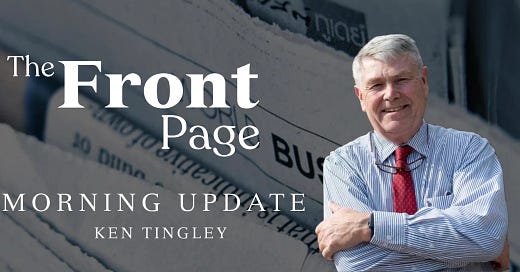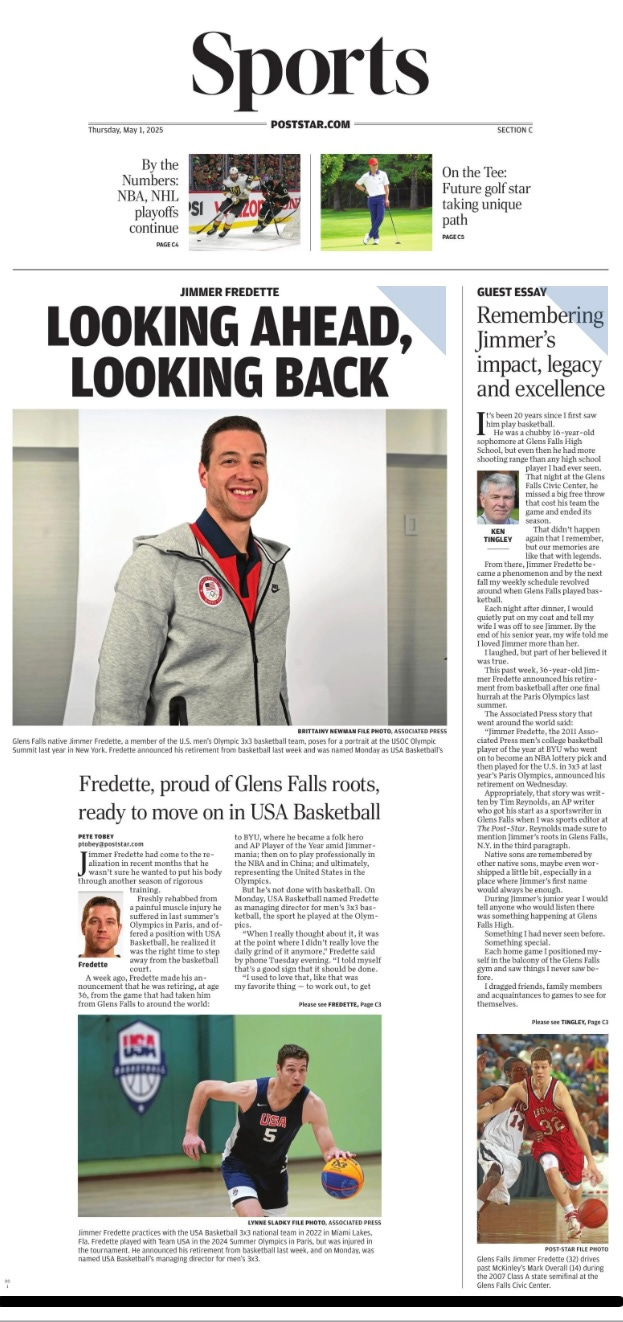Defending press freedom more important than ever
Hometown mom weighs in with update on her son the Glens Falls legend
Please consider supporting The Front Page with a paid subscription: HERE
The publisher of the New York Times wrote a novella-esque essay that sounded the alarm about the threat to democracy this week.
Like so many articles in The Times, it is thorough, and well-written, and too long. Few of you will attempt to read it and only a fraction of you will finish it.
I worry even mentioning the New York Times is a pretentious exercise that will alienate more readers than impress, because if you haven't heard, it is the liberal press.
Even worse, any of us who put ink to pen - Isn't that a great old-fashioned line? - automatically are sanctioned with that tag mostly because we are perceived to be "elites" who think we are better than others.
My dad worked in a factory. I went to a state school in Kentucky. Most of my colleagues were decidedly middle class. So that stereotype does not apply to most of us.
The essay, "A free people need a free press," is a powerful call to arms for citizens to support the media - including the Times - because as the publisher argues, "Without a free press, how will people know if their government is acting legally and in their interest? How will people know if their leaders are telling the truth? How will people know if their institutions are acting to the benefit of society? How will people know if their freedoms are being sustained, defended and championed — or eroded by forces that seek to replace truth and reality with propaganda and misinformation?"
I wish I had written that instead of Arthur Gregg Sulzberger.
Sulzberger is the 44-year-old publisher of the New York Times and from a famous newspaper family. What I didn't know about Sulzberger was that he had worked as a reporter for the Providence Journal and The Oregonian before landing at the New York Times the same time Mark Mahoney was winning the Pulitzer Prize when I was editor of The Post-Star.
It took him nine years to become publisher. Obviously, his famous name had something to do with it. He fits the bill as one of those "elites."
By the time Sulzberger was named publisher, I had been kicking around a title for my first book - The Last American Newspaper - for several years.
With each cut to the newspaper's budget, each new layoff, each criticism that our editors and journalists were biased or untruthful, the title resonated just a little bit more that newspapers, journalists and the free press were in big trouble.
By the summer of 2019, protesters in downtown Glens Falls were verbally attacking our newspaper and threatening our reporters.
Mr. Sulzberger, The Times still uses courtesy titles so I thought that appropriate, met twice with President Donald Trump shortly after becoming publisher in 2018 and "challenged" the president on his anti-press rhetoric, explaining that his accusations were seeping into a world-wide discussion about the press. Sulzberger reported Trump took "some pride" in popularizing the term "fake news."
By then, we at The Post-Star were seeing Trump's rhetoric seeping into views of local supervisors and town council members casting doubts on our reporting and accusing us of being "fake news."
I wondered if Trump took "some pride" in seeing middle-aged men screaming profanities at a 60-something Post-Star reporter?
I retired in 2020.
I published The Last American Newspaper in 2022 and adapted it into a play in 2023.
The play wasn't so much a dramatic production in its original form as a warning shot for readers, for a citizenry that didn't seem to understand what was at risk when you lose your local news outlet, so I addressed it in an opening monologue.
"What stays with me all these years later is the passion I saw in so many of the people I worked with over the years. Looking back, I don’t know if our readers really understood what it took to bring the miracle of the daily newspaper to their doorstep every single day for pennies. I think they are starting to understand now."
Sulzberger's words are a far more advanced version of my own thoughts from two years ago. As I worked on the play, Covid was receding in the rear-view mirror, the threat to our democracy from the former president was past and the future looked a little better, although newspapers were still struggling.
"I wonder now if that heart-and-soul effort was ever full appreciated. The past decade has been a time of worry about the future of community journalism and the gaping hole left behind when we are gone," I warned. "I worry now about who stands up for the community and sounds the alarm when things are not right. Who will explain the complexity of mental illness and suicide, warn of of the growing heroin problem and the shortcomings with health care and senior living conditions?"
Even I wondered if it was too much.
The Adirondack Theater Festival commissioned the play, The Capital Rep in Albany hosted the first reading in March and four more are scheduled in July as part of the Glens Falls festival.
The timing is right for a story about a free press and the First Amendment, I've been told.
Readers everywhere have experienced a diminished newspaper product that many of them revere, even worship and now desperately miss.
When my book came out, its title - The Last American Newspaper - seemed over the top for at least one editor who seemed to think was touting my own self-importance.
It was a metaphor, I tried to explain, for what was happening at newspapers all over the country.
George Clooney resurrected the McCarthy-era drama Good night, good luck on Broadway as a reminder that the Fourth Estate has to pick up the slack when the other three estates fail. It is playing to record crowds.
Just as I did in my book, Sulzberger checks in with how serious we as journalists take our mission.
"We constantly ask the same questions of ourselves that we hear from our critics," Sulzberger writes. "Were we open-minded enough to unexpected facts? Were we skeptical enough of prevailing narratives? Have we taken enough time to really understand the issues and the communities we’re writing about? Were we too soft? Too tough? Did we double-check, triple-check, then check again?"
That checks with my experience as a newspaper editor for 21 years.
Nobody beat themselves up more when you got something wrong than a reporter or editor.
"We all cared so damn much," I wrote in my book, and repeated it in the play even though I never heard anyone utter the phrase in 32 years in the Glens Falls newsroom.
That realization came later, after I retired.
It's not a bad legacy.
"Our loyalty is to the truth and to a public that deserves to know it," Sulzberger wrote. "That is the distinct role that independent news organizations like The Times play in our democracy."
Always remember that.
Sulzberger lays out the "anti-press playbook" that is being enacted every day by the president and those in his administration. You need to read it, be aware of it and condemn it.
"If the free press is designed to be a watchdog, the playbook’s goal is to tame it so it becomes a lap dog," Sulzberger said.
Not a bad line for a publisher.
A.G. Sulzberger is the fourth-generation descendant of Adolph Ochs, who bought the Times in 1896. He is journalism royalty but his concerns are my concerns and they should be your concerns.
We are of different generations and decidedly different classes. When he was born, I had been on the job as a sportswriter in Plattsburgh for seven months, but I think we are both in the same place now.
"A strong and independent press is essential to self-rule, to personal liberty, to national greatness," Sulzberger concludes. "That once radical insight, made law in the First Amendment, anchored a centuries-long, bipartisan tradition of supporting the rights of journalists. If broken, a free and independent press won’t be easy to rebuild."
It may already be too late.
Sulzberger urges us to see out news sources willing to challenge power, support them and embrace them.
"Engaging with the news is one of the simplest, most essential acts of citizenship," Sulzberger wrote. "This is not the time to tune out."
Note from mom
Back on April 28, I wrote a belated thank you to Jimmer Fredette from all of us who got to see him play from the balcony at Glens Falls High School.
This week, I heard from his mom, Kay Fredette.
My recollection is that we only met once and that was just an hour or so at their modest home where Jimmer grew up on Ogden Street. It was during Jimmer's senior year at BYU and the height of "Jimmermania."
But with the internet these days - and maybe a boost from a guest essay I submitted to The Post-Star - Kay saw the column.
Kay thanked me for another trip down memory lane and remembered another piece I wrote after Jimmer left high school. She called that one a "keeper," too.
That's the ultimate compliment for a writer.
"You seemed to be able to capture the essence of Jimmer," she wrote.
And then she told me that Jimmer is still the same person he was in Glens Falls - "a little shy, unassuming and always seems to have time for everyone."
That was great to hear.
Considering that Kay took the time to write this note to me, it is clear where Jimmer gets that from.
Back when Jimmer was playing high school ball, I used to play against his father, Al, at the YMCA. That's where the drive and determination came from.
Kay closed by saying she hoped someday his children and grandchildren will read my story to understand their father a little more. She sent the story to Jimmer, too, and she said he loved and appreciated it.
Not as much as he is still loved and appreciated here in Glens Falls.
Stand up
If you are not disturbed by what you are seeing in Washington, then you should be.
If you haven't been out in City Park in Glens Falls with a sign standing up for democracy and the rule of law, then it is about time you did.
The "We Rise" gatherings are held every Saturday from noon to 1 p.m. at the Civil War Monument in downtown Glens Falls.
Bring a sign.
Make your voice heard.
Back 60 Minutes
Jimmy Kimmel, whose late-night show is on ABC, was speaking to advertisers at Disney upfront and encouraged those present to support "60 Minutes."
These are the times we are living in where an ABC talent tells advertisers to support one of CBS's top shows.
"They deserve it," Kimmel said. "You have the power, because you have the money. Support journalism. It's important, and it doesn't work without you."
Brian Stelter, CNN's media reporter, wrote, "I've never seen anything quite like that at an upfront presentation..."
Ken Tingley spent more than four decades working in small community newspapers in upstate New York. Since retirement in 2020 he has written three books and is currently adapting his second book "The Last American Newspaper" into a play. He currently lives in Queensbury, N.Y.







I read the NY Times every day, and although MSNBC speaks to my heart, the Times speaks to my brain. And if Mr. Sulzburger's article is long, that's because he buttresses his admonitions with facts. HIs august newspaper gives me material I need to have credible opinions, to vote wisely, and to hold beliefs I can defend. Donald Trump's henchmen spent four years preparing a diabolically clever blueprint to inform their dismemberment of our democracy. The NY Times has been speaking the truth for 175 years. My money is on the Times.
Many known and unknown souls have been lost to dictators and their minions. In our country, established judiciary and legislative professionals are choosing to protect their careers over our freedoms, as if anyone is exempt from the insatiable ravishing of dictators. It is courageous to openly expose the tactics and actions that are anti-democratic ideals. Thank you to the many journalists including Ken and Will, for preceding the Sulzbergers and the Kimmels in the calls for alarm and action.